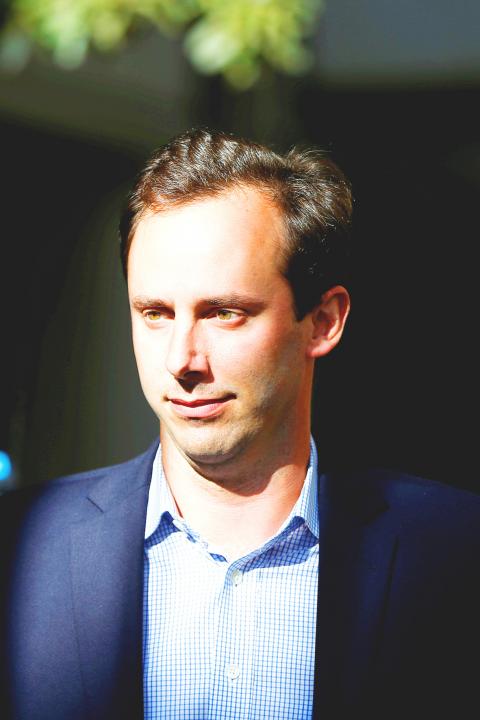Silicon Valley has a split personality about “brilliant jerks.” These are the kind of abrasive, boundary-pushing executives whom the industry, and often the media, lionizes — until they push the boundaries too far and are kicked out of the tech Garden of Eden.
Consider Anthony Levandowski, a former executive in Alphabet Inc’s self-driving vehicle project whom the US government charged this week with stealing the company’s trade secrets.
Alphabet’s Google for years enabled and rewarded Levandowski as he flouted company rules and government regulations.

Photo: Reuters
Levandowski formed several start-ups on the side while he worked at Google and then sold them to the company. He lobbied for driverless vehicle legislation in Nevada without telling his bosses, and sidestepped the permissions required to test autonomous vehicles on public roads.
Levandowski thrived with actions that would have gotten most employees fired — until his boundary-pushing involved pilfering Alphabet documents on his way to start his own autonomous-vehicle company and quickly selling it to Uber Technologies Inc, according to the indictment.
After that, Alphabet’s Waymo driverless vehicle unit sued Uber in connection with the actions of its former golden boy, and Alphabet provided documents and other ammunition for the government’s criminal case against Levandowski.
He pleaded not guilty.
His attorney said that Levandowski did not steal anything and that prosecutors rehashed “discredited” claims from the lawsuit that Waymo and Uber settled last year.
People like Levandowski, former Uber CEO Travis Kalanick, former Zenefits cofounder Parker Conrad, Theranos Inc founder Elizabeth Holmes and Playground Global founder Andy Rubin, are regarded as scrappy, visionary entrepreneurs, until they go too far, receive unwanted attention or someone with power — or courage — stands up to them.
After that, they are sometimes seen as outliers and monsters who sully the tech industry’s reputation.
Yet can it truly be a surprise that if rule-breaking executives are lauded and rewarded for this behavior, they might at some point break rules to the point of stealing from the company, misleading board members, obtaining medical records about a rape victim, orchestrating a massive fraud or committing sexual misconduct against a coworker?
If people have evidence that normal rules do not apply to them, it seems natural that they could exploit that permissiveness.
That is exactly what some Google employees have been saying about a culture that they contend repeatedly protected executives accused of misconduct at work.
On Wednesday, Jennifer Blakely, a former manager in Google’s legal department, described what she said was the aftermath of a sexual relationship with David Drummond, Alphabet’s top lawyer.
She was required to transfer out of the legal department, and Blakely said she believed Drummond at one point sought custody of their child as payback for her request for financial support or interaction with their son.
Drummond did not reply to an e-mail seeking comment, Bloomberg News reported.
Sidestepping conventions can sometimes make a good company great or push along a nascent technology product.
The question is whether the benefits of a boundary-pushing culture outweigh the Levandowski and Drummond-type examples of harm from tolerating or applauding bad behavior from a chosen few.
Surely it is not healthy to one minute applaud and enable visionary rogues and then be surprised when those people do terrible things.
What if “brilliant jerks” are just plain jerks?

Nvidia Corp chief executive officer Jensen Huang (黃仁勳) on Monday introduced the company’s latest supercomputer platform, featuring six new chips made by Taiwan Semiconductor Manufacturing Co (TSMC, 台積電), saying that it is now “in full production.” “If Vera Rubin is going to be in time for this year, it must be in production by now, and so, today I can tell you that Vera Rubin is in full production,” Huang said during his keynote speech at CES in Las Vegas. The rollout of six concurrent chips for Vera Rubin — the company’s next-generation artificial intelligence (AI) computing platform — marks a strategic

Enhanced tax credits that have helped reduce the cost of health insurance for the vast majority of US Affordable Care Act enrollees expired on Jan.1, cementing higher health costs for millions of Americans at the start of the new year. Democrats forced a 43-day US government shutdown over the issue. Moderate Republicans called for a solution to save their political aspirations this year. US President Donald Trump floated a way out, only to back off after conservative backlash. In the end, no one’s efforts were enough to save the subsidies before their expiration date. A US House of Representatives vote

REVENUE PERFORMANCE: Cloud and network products, and electronic components saw strong increases, while smart consumer electronics and computing products fell Hon Hai Precision Industry Co (鴻海精密) yesterday posted 26.51 percent quarterly growth in revenue for last quarter to NT$2.6 trillion (US$82.44 billion), the strongest on record for the period and above expectations, but the company forecast a slight revenue dip this quarter due to seasonal factors. On an annual basis, revenue last quarter grew 22.07 percent, the company said. Analysts on average estimated about NT$2.4 trillion increase. Hon Hai, which assembles servers for Nvidia Corp and iPhones for Apple Inc, is expanding its capacity in the US, adding artificial intelligence (AI) server production in Wisconsin and Texas, where it operates established campuses. This

US President Donald Trump on Friday blocked US photonics firm HieFo Corp’s US$3 million acquisition of assets in New Jersey-based aerospace and defense specialist Emcore Corp, citing national security and China-related concerns. In an order released by the White House, Trump said HieFo was “controlled by a citizen of the People’s Republic of China” and that its 2024 acquisition of Emcore’s businesses led the US president to believe that it might “take action that threatens to impair the national security of the United States.” The order did not name the person or detail Trump’s concerns. “The Transaction is hereby prohibited,”